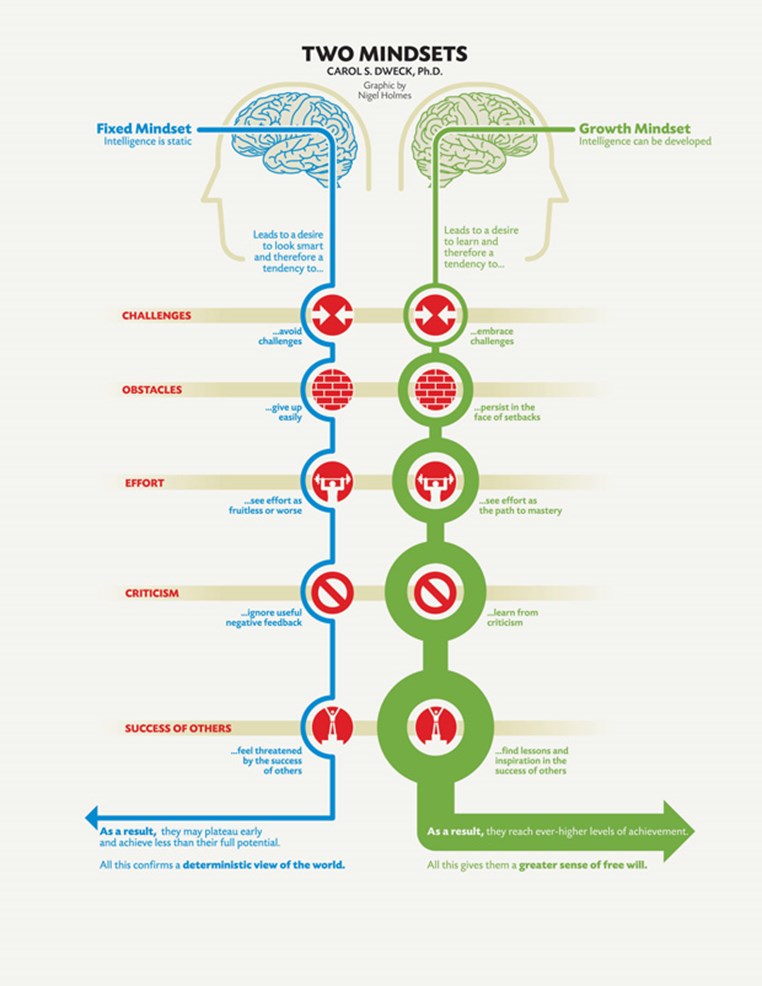Growth mindset and why it matters for your business
We all know that a business must evolve to survive. As a business leader you need to think ahead, take risks, and learn from your mistakes. More than that, it’s your job to motivate your people to push themselves as well.
When your people evolve, your business does too.
When it comes to motivation your first thoughts might be on incentives, bonuses and recognition but before you go there, we recommend digging a little deeper. Get an understanding of how an individual's innate beliefs affect their resilience, drive, and approach to growth. Armed with this knowledge you can develop a growth culture that will take your business to the next level.
In her study of human motivation Carol Dweck describes two contrasting mindsets. A ‘fixed mindset’ where intelligence is static and a ‘growth mindset’ where intelligence can be developed. This fundamental difference has a huge effect on an individual's motivation and approach to growth.
 If someone believes there is a cap on intelligence and a limit to growth, a fixed mindset, it makes sense that if they aren’t good at something right away it’s not worth investing time into it. It becomes more important to show others they are competent by always winning and never making mistakes. The issue with this, is that making mistakes is a natural part of learning. If your team doesn’t feel safe enough to make a mistake now and then, they aren’t pushing themselves and evolving as much as they could be, and your business is missing out.
If someone believes there is a cap on intelligence and a limit to growth, a fixed mindset, it makes sense that if they aren’t good at something right away it’s not worth investing time into it. It becomes more important to show others they are competent by always winning and never making mistakes. The issue with this, is that making mistakes is a natural part of learning. If your team doesn’t feel safe enough to make a mistake now and then, they aren’t pushing themselves and evolving as much as they could be, and your business is missing out.
In contrast to a fixed mindset, people with a growth mindset are orientated to learning, improving, and expanding their skill set through effort and experience. A growth mindset makes individuals more resilient and more likely to learn from setbacks and push past them. This persistence is what pushes people to reach their potential, potential that can be utilised by your business.
In the world of recruitment and people & culture, we are seeing more of a demand for talent with a growth mindset because business leaders are realising the benefits. The great news is you can shift your team's thinking by creating a growth mindset culture. Aside from the obvious benefits of increased motivation and capability, research shows that that those who work in companies who promote a growth mindset are:
34% more likely to feel a strong sense of belonging and commitment
47% more likely to say their colleagues are trustworthy
65% more likely to say their company promotes risk taking
49% more likely to say their company promotes innovation
All of this is going to have a positive impact on your company, affecting both culture and the output. So how can you start to be more deliberate about bringing a growth mindset into the workplace?
We are here to help. Here are three simple tips:
1 - The power of the word YET!
The word itself implies that anything is possible. Simply encouraging the word Yet into daily vernacular will start to plant the growth mindset seed. Another tactic is in performance appraisals, instead of using “not competent” or “not meeting expectations”, replace with “not yet”, it has real psychological power.
2 - Create space for learning
When our days are crammed and capacity is maxed to the limit, there is little space to learn, or collaboration, the best ideas and innovation comes from your employees when they have space. Try to save 10% of the productive time for this very purpose.
3 - Turn everything into a learning opportunity
One of our favourite feedback frameworks is “do well, do different”. After a big meeting or project or even weekly check ins, we ask ourselves, what did we do well, and what could/should we have done differently? This provides a safe and supportive learning environment.
If you are interested in learning more about individual coaching for leaders or introducing a growth mindset into your business contact one of the team at Sprout for more information.
Sean Brennan - Mechatronics Engineering Manager, ZerojetSprouts growth mindset workshop gave me some great insights to how to best pivot behaviour and encourage the best positive space for our teams.


